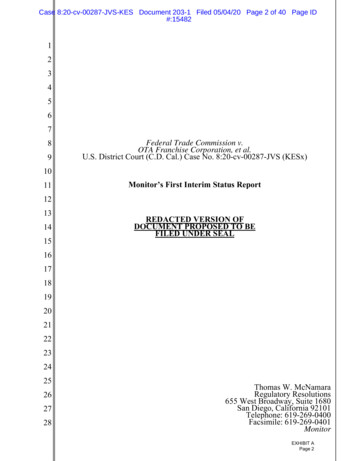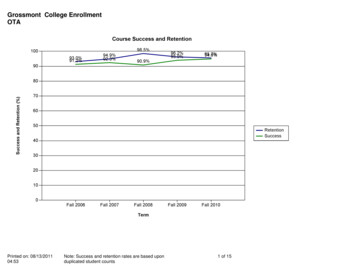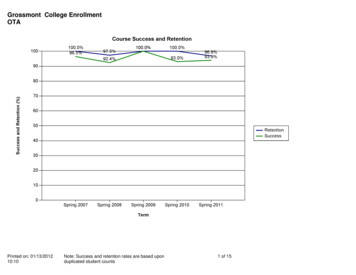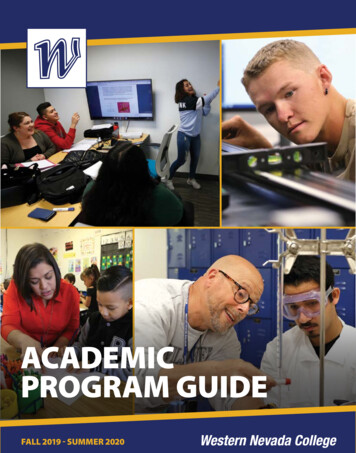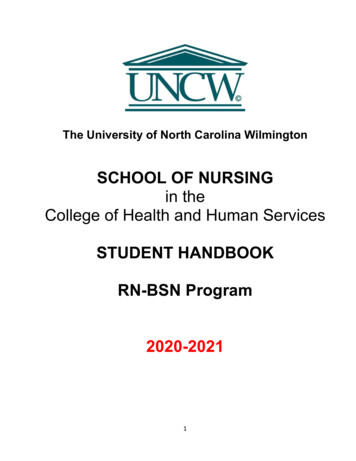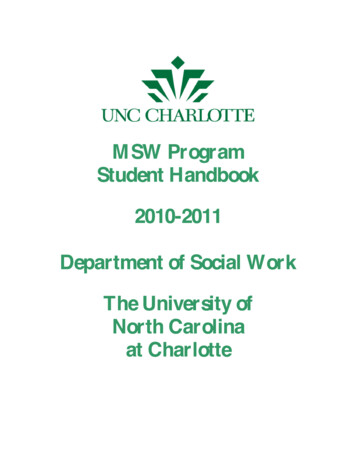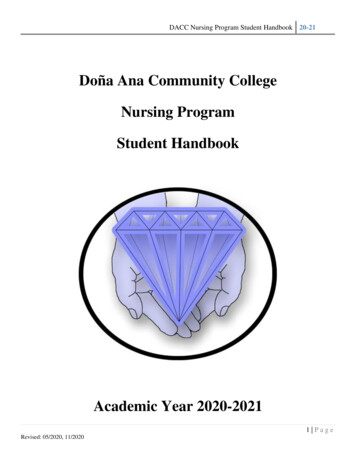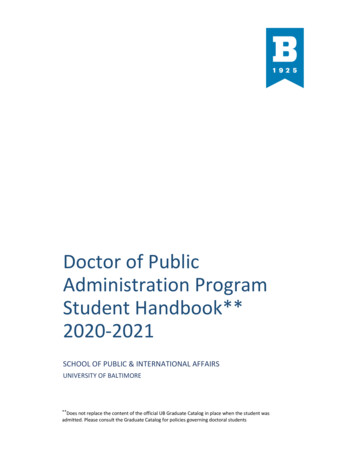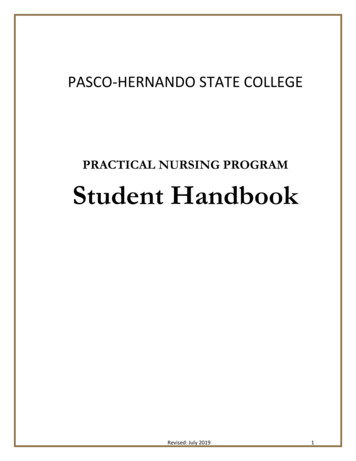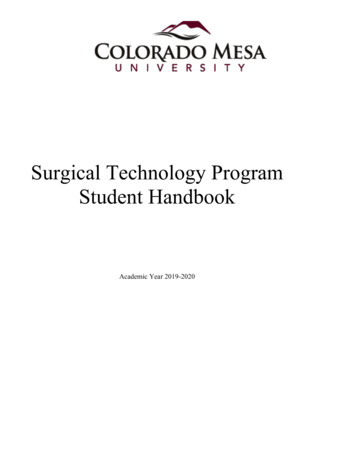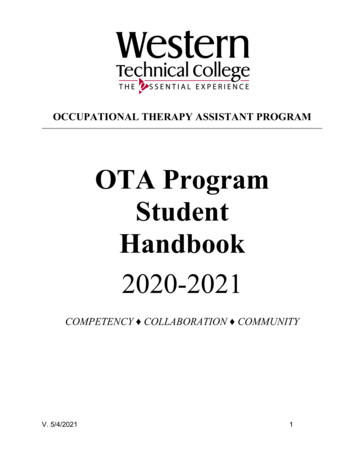
Transcription
Technical collegeT H E S S E N T I A L EX P E RI E N C E OCCUPATIONAL THERAPY ASSISTANT PROGRAMOTA ProgramStudentHandbook2020-2021COMPETENCY COLLABORATION COMMUNITYV. 5/4/20211
V. 5/4/20212
Table of ContentsGUIDE TO THE OTA STUDENT HANDBOOK . 5INTRODUCTION . 7WELCOME .7STUDENT SUCCESS .7GETTING TO KNOW THE OTA PROGRAM. 9OTA PROGRAM MISSION .9OTA PROGRAM PHILOSOPHY .9CURRICULUM DESIGN .10OTA PROGRAM OUTCOMES .17PROGRAM STUDENT LEARNING OUTCOMES .17MAKING CONNECTIONS AND GETTING ASSISTANCE.17RESOURCES .21PROFESSIONAL BEHAVIORS .23ACADEMIC PROGRAM. 26PROGRAM STRUCTURE.26FACULTY.27COMMUNICATION .28HEALTH AND SAFETY .29CLASSROOM EXPECTATIONS .32GRADING.35PROFESSIONAL INVOLVEMENT .2GRADUATION AND BEYOND.2FIELDWORK EDUCATION. 5SCOPE AND PURPOSE .5SELECTION OF SITES .5GENERAL EXPECTATIONS .6SITE-SPECIFIC EXPECTATIONS .8FORMS AND POLICIES .9SUCCESS AT FIELDWORK .9OTA STUDENT HANDBOOK ACKNOWLEDGEMENT FORM .10APPENDICES TO THE OTA STUDENT HANDBOOK. 11WESTERN’S OTA CURRICULUM OUTLINE.13PROFESSIONAL BEHAVIOR ASSESSMENT .49PROFESSIONAL BEHAVIORS POLICY .55HONESTY AND INTEGRITY POLICY .56OTA CONFIDENTIALITY AGREEMENT .57HEALTH AND PUBLIC SAFETY DIVISION CONFIDENTIALITY POLICY .58HEALTH SCIENCE CENTER ACCESS ACKNOWLEDGMENT OF RECEIPT AND RESPONSIBILITY .59HEALTH AND PUBLIC SAFETY DIVISION POLICIES .61TB Policy. 61Social Media Policy . 61HPS PERFORMANCE AND PRACTICE OF CLINICAL SKILLS POLICY .63LIABILITY WAIVER AND DIRECT SUPERVISION AGREEMENT .63ATTENDANCE POLICY .64OTA PROGRAM DRESS CODE .65PROGRAM PROGRESSION AND GRADUATION POLICY .66EXAMINATION (EXAM) POLICY .68RE-ENTRY POLICY .71OTA PROGRAM TRANSFER POLICY .75OTA STUDENT TRANSFER RECOMMENDATION FORM .76STUDENT OCCUPATIONAL THERAPY ASSOCIATION (SOTA) -BY-LAWS.77OTA FIELDWORK SELECTION AND SCHEDULING POLICY .81V. 5/4/20213
FIELDWORK ATTENDANCE POLICY.83HPS CLINICAL POLICIES.84Disclosure of Possible Bar from Clinical* Experiences Policy . 84Immune Status Impact on Clinical* Experiences Policy. 84Health and Public Safety Division Body Art or Piercing Policy. 85Influenza Vaccine or Immunization Refusal Policy. 85OTA FIELDWORK EVALUATION AND GRADES POLICY .87UNFULFILLED FIELDWORK POLICY .101STATUS .101DEFINITION.101PROCEDURES .101STATUS .101DEFINITION.101PROCEDURES .101STATUS .101DEFINITIONS .101PROCEDURES .101PROFESSIONAL ORGANIZATIONS AND REGULATORY AGENCIES .105OTA STUDENT HANDBOOK ACKNOWLEDGEMENT FORM .107V. 5/4/20214
Guide to the OTA Student HandbookAbbreviationsOT – Occupational Therapy or Occupational TherapistOTA – Occupational Therapy AssistantOTR – Occupational Therapist, RegisteredCOTA – Certified Occupational Therapy AssistantOTAS – Occupational Therapy Assistant StudentFW – FieldworkFWE – Fieldwork Education or Fieldwork EducatorAFWC – Academic Fieldwork CoordinatorSOTA – Student Occupational Therapy AssociationAOTA – American Occupational Therapy AssociationWOTA – Wisconsin Occupational Therapy AssociationACOTE – Accreditation Council for Occupational Therapy EducationNBCOT – National Board for the Certification of Occupational TherapyHSC – Health Science CenterHPS – Health and Public Safety (Division)WTCS – Wisconsin Technical College SystemUW-L – University of Wisconsin - La CrosseNote: The Program Faculty of the OTA Program at Western Technical College reserve the right to make anyadditions or changes in program policies or handbook as deemed necessary at any time throughout the courseof the program. Students will be notified of new policies and/or changes in program policies in writing.The websites for the following resources are:OTA Program programs/documents/OTA Student Handbook.pdfWestern Student . 5/4/20215
V. 5/4/20216
IntroductionWELCOMEYou are now a student of the Occupational Therapy Assistant Program. On behalf of the faculty,Advisory Committee, alumni and community partners of the program, we welcome you! Afterconsideration of your options, you chose OT as your field and Western as your college; youcompleted various admission requirements, shadowed with an OT practitioner and decided todedicate your education to the development of a career as an OTA. Congratulations!You are entering a profession that has a strong heritage of supporting individuals reach theirgreatest participation in life activities. Our national organization, the American OccupationalTherapy Association, is celebrating its 100th anniversary! The OTA Program at Western wasawarded developing status in 1995 under the direction of Doreen Olson, OTR; we graduated thefirst OTA class in 1998 and moved to our current location in the Health Science Center in 2000. Wewere most recently reaccredited in 2013. The graduates from our program have been successful inbecoming nationally certified and are enjoying rewarding careers as OTAs.The program is accredited by the Accreditation Council for Occupational Therapy Education(ACOTE) - c/o Accreditation Department, American Occupational Therapy Association (AOTA),4720 Montgomery Lane, Suite 200, Bethesda, MD 20814-3449; phone 301.652.2682 orwww.acoteonline.org. Graduates of the OTA Program are awarded the Associate in AppliedScience degree and are eligible to sit for the national certification exam for OTAs administered byNBCOT.Student SuccessThe aim of the OTA Program is that you progress successfully through each stage of the program,learn the competencies needed to be an OTA and are able to serve the community with your skillsand passions. You will spend the better part of two years completing the courses of the OTAProgram. The courses will be rigorous and rewarding, with all learning activities leading to yourpreparation as an entry-level, generalist OTA. This will require a focused commitment of time,resources, energy and dedication to excellence.You will have to absorb a lot of information and apply that information in the laboratory setting andfieldwork. You will have to develop critical thinking skills, empathy, and knowledge relating to thefield of OT. That is how it is in the practice of OT; every client and every situation is unique. Youcan’t memorize all the answers, but you will be expected to apply basic OT practice skills that youhave learned. The community has high expectations for our program to prepare qualifiedpractitioners; in turn, there is strong support by faculty to lead students in achieving the “three Cs”of the program mission – competency, collaboration, community.You will be educated on and held accountable for your professional behaviors. What areprofessional behaviors? They are those qualities—over and beyond the knowledge and the skillsyou learn—which are essential for your success in the classroom and practice. In broad terms, youwill be expected to demonstrate respect for others, communicate effectively, collaborate with teammembers, and display the dependability and ethics expected of a professional. The socializationinto these professional values and behaviors begins as you enter the program.This OTA Program Student Handbook is one tool for guiding you; it provides a reference forimportant information and resources for student success. Keep and update this handbook throughoutV. 5/4/20217
your enrollment in the program. The most current program information can be located on the OTAProgram webpage.Those who make the most of the program learn early on that the instructors, fieldwork educators,tutors, counselors, and other college personnel work extremely hard to build a bridge for you tosuccessfully graduate and realize your dream. We are on your team, so keep the communicationlines open; seek out your faculty and college staff to support you. You can become an OccupationalTherapy Assistant and enjoy a rewarding and successful career. It is up to YOU, the student, to besuccessful we are here to help you achieve your goals.V. 5/4/20218
GETTING TO KNOW THE OTA PROGRAMOTA Program MissionWestern’s Occupational Therapy Assistant (OTA) Program promotes student success throughexcellence in learning and professional behaviors. The OTA Program prepares students as entrylevel practitioners through a competency-based education, collaborative efforts and communitypartnerships.OTA Program PhilosophyThe OTA Program abides by the philosophy of the occupational therapy profession. We believethat: “All individuals have an innate need and right to engage in meaningful occupations throughouttheir lives. Participation in these occupations influences their development, health and well-beingacross the lifespan“(Gupta et al., 2011). Engagement in occupation is complex andmultidimensional; various integrated factors contribute to the quality of participation, including:client factors, performance skills, activity demands, performance patterns, contexts andenvironments (AOTA, 2014). Occupational therapy services are client-centered, with thepractitioner using clinical reasoning, the therapeutic relationship and a code of ethics to supportclients’ goals; the overarching outcome is engagement, which is “the result of choice, motivation,and meaning within a supportive context”; practitioners accomplish this by “creating opportunities to engage in occupations that lead to participation in desired life situations.”(AOTA, 2014, p.S4).Students in the OTA Program are regarded as occupational beings with a desired life situation toserve as an OTA; as such, they learn and grow through participation in meaningful occupation inthe role of an OTA student. Therefore, the OTA Program is student-centered to foster success bydeveloping students’ skills through intentionally planning the curricular demands and providing apositive learning environment; the program seeks to integrate and balance the students’ abilities,needs, life roles and contexts. The OTA Program respects students as adult learners and supportstheir growth through a multifaceted approach in the curriculum design (e.g., didactic instruction,experiential learning activities, community engagement, and socialization to professional values).The curriculum is grounded in established outcomes that are based on entry-level expectations; thefaculty work closely with students in providing clear instruction and guidance to professionalstandards, as well as applying flexibility in instructional approaches to ensure student achievement.As part of the college community, students of the OTA Program are offered a wide range ofcurricular activities, advisement, and student services to ensure balance between their role asstudent and other life demands. The program embraces the values of Western Technical Collegeduring instruction and extracurricular activities to ensure integrity and dignity in all student-facultyinteractions. The aim of the program is to support the students’ active engagement and ownership oftheir own education in forming their identity as an occupational therapy practitioner.The OTA Program is mission-driven; that is, the mission is embraced by all levels of theorganization to support commitment and performance (Cardona & Rey, 2008). The mission of theOTA Program directly fulfills and advances the mission and values of Western Technical College.The program adopts the SuccessAbilities for educational programs of the college as the foundationfor comprehensive Program Outcomes. Essent
Technical college T H E S S E N T I A L E X P E R I E N C E OCCUPATIONAL THERAPY ASSISTANT PROGRAM OTA Program Student Handbook 2020-2021 COMPETENCY COLLABORATION COMMUNITY V. 5/4/2021 . 1

